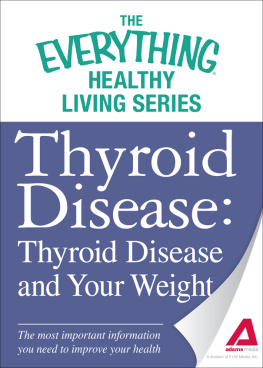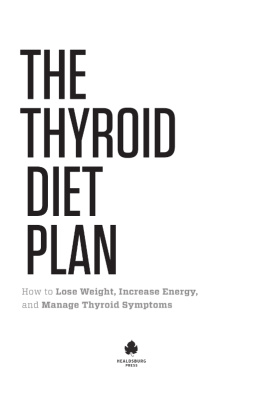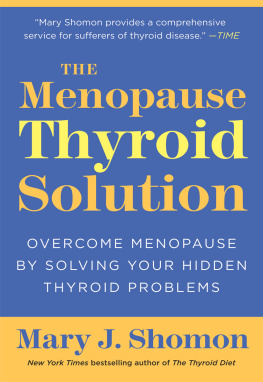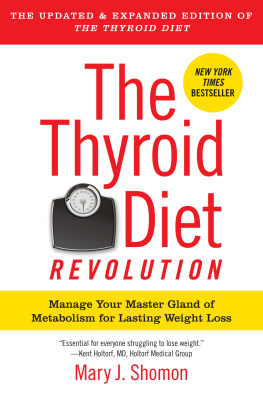MARY J. SHOMON
Im not afraid of storms,
for Im learning to sail my ship.
L OUISA M AY A LCOTT
Totie Fields once said, Ive been on a diet for 2 weeks and all Ive lost is 2 weeks. If youre trying to lose weight, you may feel like Totie is talking about you. You may have tried diet after diet, joined Weight Watchers, tried herbal diet pills, or read dozens of diet books that tell you to eat all protein, or cabbage soup, or ice cream, or 1,000 or less calories per day, only to discover that youre not losing weight and might even be gaining it! Thats what happened to me 10 years ago when I joined Weight Watchers, followed it to the letter, and gained 2 pounds a week while everyone else was losing weight.
Or you may never have had a weight problem, then all of a sudden, the pounds started piling on, seemingly defying all the laws of physics. If it takes 3,500 excess calories to gain a pound, how could you possibly have gained 10 or 20 pounds in 1 month? And yet you did. This is what happened to me at age 33 before my 1995 wedding. After going through my 20s as a slender size 8, I quickly started packing on weightso much so that I bought a size 12 gown, and in the months before my wedding, I had to have my wedding dress let out two more sizes (is that a horrifying thing for a bride or what?). Even after I went on a reduced-calorie diet with daily exercise, I walked down the aisle as a size 16. After the honeymoon, the weight kept piling on.
Gena had a similar experience in her late 30s:
I have a 20th school reunion coming up in my little hometown. I was always a perfect size, I played high school sports, and was a homecoming queen candidate. Sometime in my senior year, I woke up very sick one morning. The doctor told my mom that it was a thyroid infection. I took a lot of tests, got medication, and finally felt like my old selffor maybe a year. What I didnt realize was the damage that was done to my thyroid gland would mess me up for the rest of my life. I gained weight from about 105110 when I graduated from high school to about 205 being my top weight. And I do not eat any more than I used to; in fact, Im eating much healthier now. Im depressed, because Ive turned from a skinny, healthy person into a person who just feels awful about her looks and is very embarrassed to go back to my hometown. If I could wear a sign that says I HAVE A THYROID DISORDER around my neck, maybe people wouldnt look at me and think, Look at that fat, lazy personshe needs to push away from the table.
Maybe you have been eating the same way as usual and getting the same level of physical activity as always, but youre wondering why this past 6 months you have managed to put on a pound a week.
In the midst of any of these situations, you may go to see your doctor, saying, I know something is really wrong with me. And you may be sent home with one of the following:
A. An antidepressant, because after all, depression makes you gain weight, so that must be it
B. A diet drug, because writing a prescription gives your doctor something useful and doctor-like to do
C. A shrug of the shoulders, along with one of those vague nonexplanations like, Well, youre getting olderits to be expected, or It must be your hormones, or Its normal after having a baby, and so on
D. A condescending look, along with some serious medical advice along the lines of, Well, you must be eating too much and not getting enough exercise, so get off the couch and stop strapping on the feedbag!
Gee, Doctor, thanks.
You know something is not right, and you know that you are not sitting around lazily stuffing your face with bonbons, but you dont get the feeling that the doctor believes you. And the sad fact is, he or she probably doesnt. One late 2003 study showed that not only general practitioners but even health professionals who specialize in treating obesity have negative stereotypes about people who are overweight, including associating them with being lazy, stupid, and worthless. Most doctorsand the people around you, to an even greater extenthave an automatic antifat bias.
You know something is wrongsomething is not normalbut who believes you?
I believe you.
Because while your doctor is busy assuming that youre too lazy to exercise and dont have enough willpower to stop eating, what he or she isnt doing is telling you that you could have a thyroid problema dysfunction in the small, butterfly-shaped gland in your neck that is crucial to your metabolism. While some narrow-minded doctors dismiss thyroid disease as just another lame excuse for being overweight, the reality is that for millions of overweight people, thyroid disease is a very real reason for weight problems. Learning about thyroid disease and its symptomsbeyond weight problemsand how to get diagnosed can be critical steps that address the underlying cause of your weight gain, help restore your hope and health, and allow healthy diet and exercise to finally work the way they should!
Recent studies have conservatively estimated that as many as 20 million people have a thyroid problem, the majority of them undiagnosed. Some experts believe that the actual number is substantially higher and rapidly on the rise. At the same time, studies have shown that 97 million Americans are overweight or obese. Thats nearly three in five: 59.4% of all men and 50.7% of all women.
This brings up a critical connection: some people struggling with a weight problem are facing even more of an uphill battle than everyone else, because they are dealing with an underlying thyroid condition that is both undiagnosed and untreated. One study found that as many as 40% of overweight people had evidence of a dysfunctional thyroid.
I went to the doctor a number of times complaining about a variety of symptoms such as
- Unexpected weight gain, despite diet and exercise
- Fatigue and exhaustion
- More hair loss than usual
- Moodiness
- Muscle and joint pains and aches
- Loss of sex drive
My doctor took a wait-and-see approach for a few months, but then she put together the symptoms and decided she should test my thyroid. I was surprised when she called to say that I was hypothyroid. I didnt even know what a thyroid was. Sure, Id heard overweight people laughingly refered to as having glandular problems, and I had an aunt who had a goiter once, but that was the extent of my knowledge about the master gland of metabolism.
My doctor put me on thyroid hormone replacement therapy. Blissfully ignorant, I assumed that all the symptoms, particularly the pounds, would disappear as quickly as they had appeared now that I was getting my thyroid back in order.
Surprise! Not so.
Sure, as we tweaked my medicine and dosages, I felt better in some waysless exhausted, not so moody and achybut except for several pounds, the weight didnt budge. In my 20s, before my thyroid apparently started to go awry, losing weight was simple. I just cut out a bag of chips with lunch a few times a week and switched to a diet soda instead of regular, and within a few weeks, the extra pounds would be gone.
But nothing I was doing in the beginning moved the scale an ounce. This wasnt going to be so easy. So I set out on a mission. To discover how best to optimize my thyroid treatment. To learn what and how much I could and couldnt eat in order to lose weight. To find out whether I needed to exercise, what type of exercise, and how much. To learn how to get back on track when my weight-loss efforts got stalled or even derailed.








